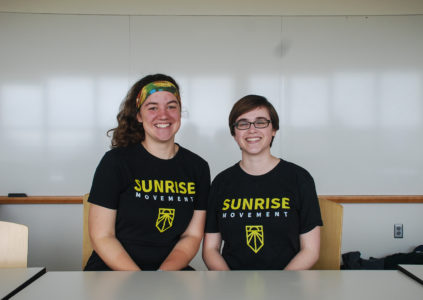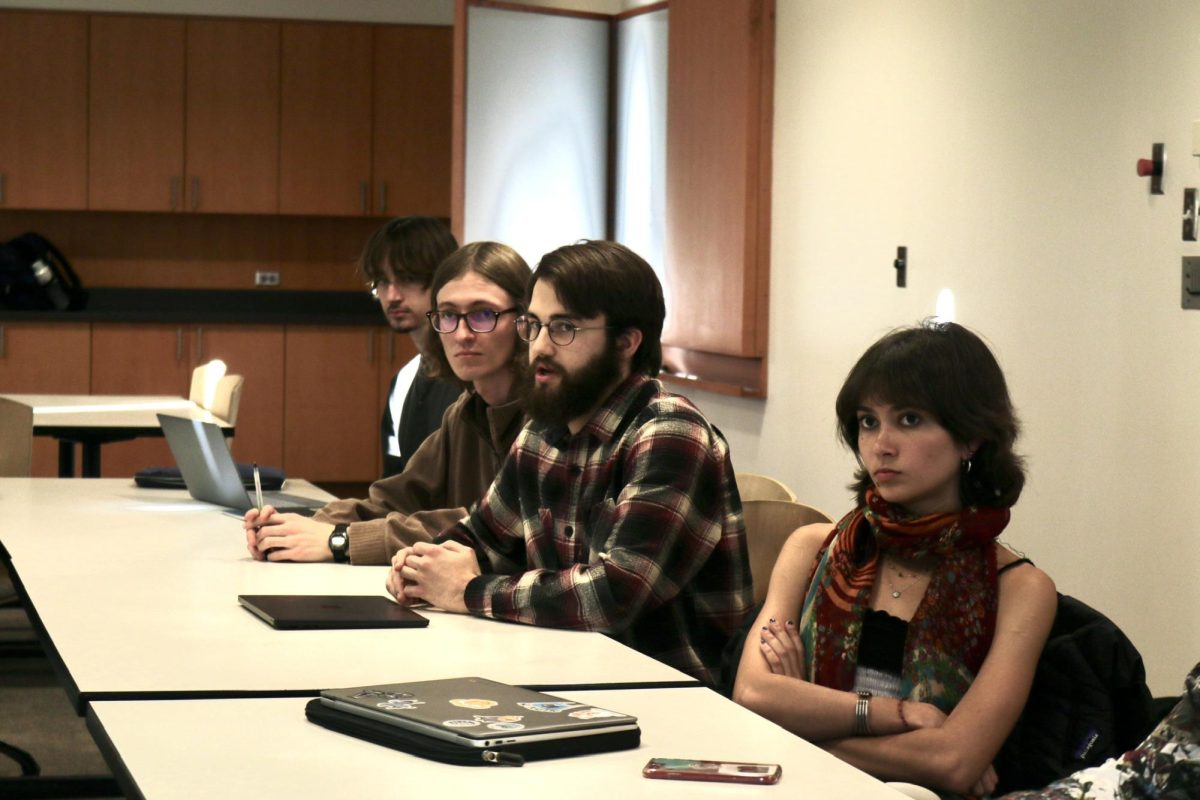By Julia Anderson
anderson14@grinnell.edu
Sunrise Movement, a national organization led by young adults and focused on taking political action to combat global climate change, now has a local chapter at Grinnell College. The organization’s goals are framed around a three-part statement: our planet is threatened by climate change, viable solutions exist and a greedy few are preventing large-scale political change from occurring. In response, Sunrise Movement urges young people to organize in solidarity to focus on bringing political change. “We are the majority. We will win,” the organization’s website declares.
Hannah Dorf and Megan Gardner, both ’20, became certified as Sunrise hub coordinators this semester. They attended a series of educational discussions online through the national organization in order to learn about the movement’s goals and how to properly lead one of its chapters.
“Last semester, I was abroad studying climate change in the arctic, so I was like climate change is my new thing, this is what I’m going to do. … So I have more of the climate science kind of side, and Hannah has more of the action, social aspect of it,” said Gardner.
In October 2018, the Intergovernmental Panel on Climate Change issued a report that described the likelihood of environmental crisis as early as 2040. If greenhouse gas emissions continue at their current rate, 2040 may mark the onset of the most drastic effects of global climate change, including increased droughts, wildfires, food shortages and poverty. Due to the urgency of environmental destruction, Sunrise emphasizes the importance of young people engaging in activism now.
“It’s super important for young people to band together on this one issue that will affect our future within the next 10 to 15 years and to show our congresspeople how much this matters to us and how important we think it is for our future. It feels gross planning for my future, knowing that it could not be there,” Gardner said.
Sunrise gained national recognition in November 2018 when 200 of its activists occupied Nancy Pelosi’s office in protest. This sit-in was one of Sunrise’s many efforts to promote the Green New Deal, one of the major focuses of the organization.
Congresswoman Alexandria Ocasio-Cortez and Senator Ed Markey introduced the Green New Deal resolution, which aims to achieve net-zero greenhouse gas emissions in the United States by 2030. The resolution focuses on transitioning to sustainable energy sources while simultaneously creating new jobs and acknowledging issues of social justice.
“It’s a resolution, so it’s not necessarily a law, but it’s a promise to work towards these laws. So a promise to work towards green energy with the goal of complete green energy in the US by 2030, which is possible,” said Dorf.
“It would be very expensive, and that’s one of the things it doesn’t mention is how much it would cost, but it’s the only big, national climate action promise that’s out there. … It’s a big deal because it shows us that [Ocasio-Cortez] and Ed Markey are working for our future,” Gardner said.
The authors of the IPCC report estimated the cost of transforming the world economy to counteract the environmental damage already caused to be around $54 trillion. The cost of such an ambitious project is largely due to the need to completely restructure global energy sources. However, leaders of the Sunrise Movement acknowledge that the initial cost would ultimately pay off when sustainable energy sources are put in place.
The College’s Sunrise hub is still in its beginning stages, but the hub leaders are working on expanding the group’s reach. They officially launched the group on February 14 and have held introductory meetings. The leaders hope to meet more regularly during the remaining part of the semester, on Thursdays at 7 p.m. in the JRC.
As for future goals, Dorf and Gardner highlight the 2020 election as a primary focus for Sunrise. As presidential candidates and other politicians visit Grinnell in the upcoming months, they hope to use Sunrise to promote climate change as a leading issue for the Democratic Party.
“This is a school that I feel like is full of people that want to be activists, because we are supposed to be committed to social change. … I really hope that this can be an organization for people that are passionate to make social change. Because I feel like fighting for the environment is something that we all should be able to agree on. … I’m worried about the future, so I really want to be a part of fighting for it,” Dorf said.





















































